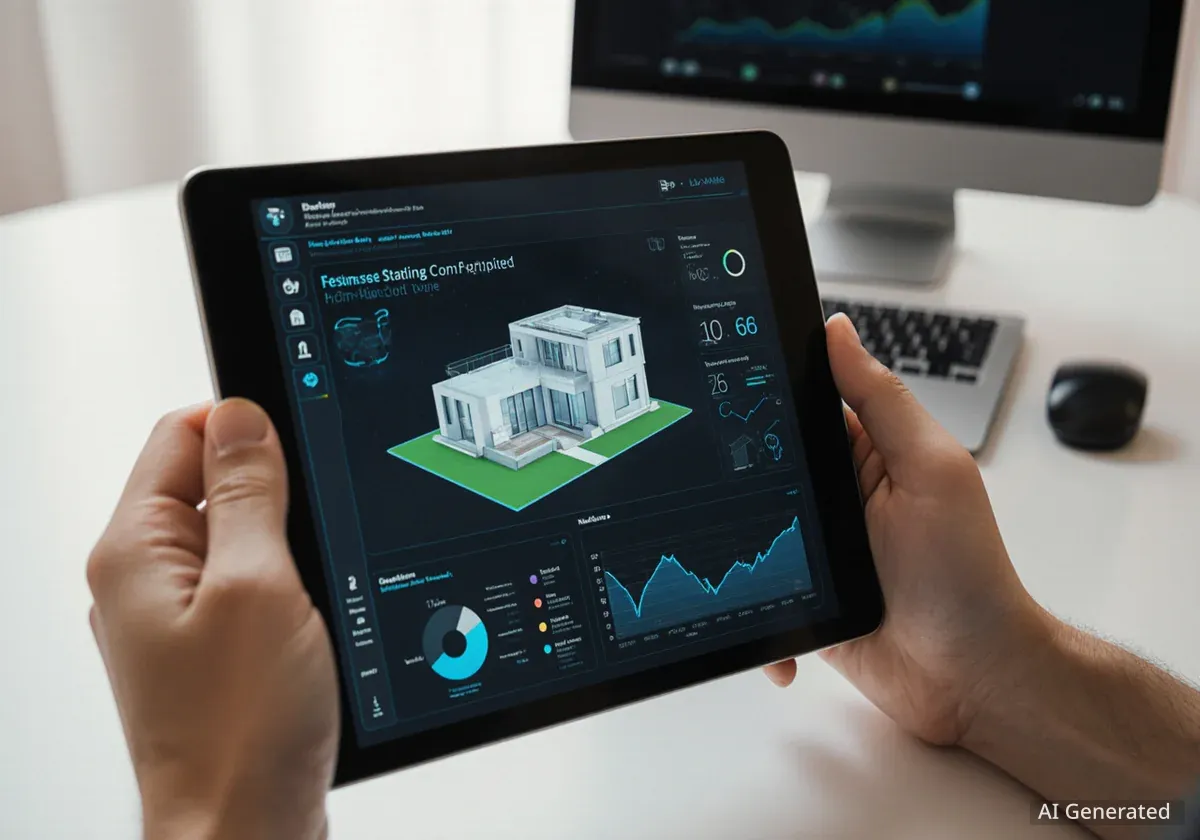Aroundtown, one of Europe's largest real estate companies, has entered into a partnership with technology firm PassiveLogic to deploy an AI-driven autonomous platform across its property portfolio. The collaboration aims to enhance operational efficiency, reduce energy consumption, and lower carbon emissions in its buildings.
The implementation of PassiveLogic's generative autonomy technology is designed to prepare Aroundtown's assets for stricter European Union sustainability regulations, including the upcoming Energy Performance of Buildings Directive (EPBD) requirements.
Key Takeaways
- Aroundtown and PassiveLogic have formed a strategic partnership to modernize building operations.
- The collaboration involves deploying PassiveLogic's AI-powered autonomous controls and digital twin platform.
- Key objectives include reducing operational costs, cutting carbon emissions, and improving building performance.
- This initiative will help Aroundtown's portfolio meet the standards of the EU's Energy Performance of Buildings Directive (EPBD).
A Strategic Move in European Real Estate
The partnership brings together a major player in the European property market and a specialist in building automation technology. Aroundtown, which is listed on Germany's M-Dax index, manages a substantial portfolio of office, residential, and hotel properties, primarily located in Germany and the Netherlands.
PassiveLogic specializes in creating generative autonomy platforms for the built environment. Its technology uses artificial intelligence to manage and optimize building systems like heating, ventilation, and air conditioning (HVAC) in real-time without constant human intervention.
By integrating this technology, Aroundtown aims to transition its building management from a reactive model to a proactive, predictive one. The system is expected to autonomously make adjustments to optimize energy use, maintain tenant comfort, and identify potential maintenance issues before they become critical.
What is the Energy Performance of Buildings Directive (EPBD)?
The EPBD is a key component of the European Union's strategy to achieve a fully decarbonized building stock by 2050. The directive sets progressively stringent energy performance standards for new and existing buildings. Regulatory thresholds are scheduled to begin as early as 2026, requiring property owners to make significant upgrades to improve energy efficiency and reduce emissions.
The Technology Behind Autonomous Buildings
At the core of the deployment is PassiveLogic's AI platform, which creates what the company calls a "Quantum digital twin" for each building. This is a highly detailed, physics-based virtual model of the property and all its interconnected systems.
How Digital Twins Work
The digital twin acts as a real-time simulation environment. It understands how a building's equipment and environmental factors interact. The platform's AI uses this model to:
- Continuously analyze data from sensors throughout the building.
- Predict future energy needs based on weather forecasts, occupancy patterns, and other variables.
- Make autonomous decisions to control HVAC, lighting, and other systems for maximum efficiency.
- Provide building operators with real-time visibility and control over all major systems.
This approach moves beyond traditional building automation systems, which often rely on pre-programmed rules and require manual adjustments. PassiveLogic's system is designed to learn and adapt on its own, continuously seeking the most efficient operational state.
"Buildings are no longer passive infrastructure; with AI and autonomy, they're becoming a new workforce that manages energy, operations, and sustainability on their own," said Troy Harvey, CEO of PassiveLogic. "Aroundtown's footprint will serve as a model for the industry, showcasing how our generative-autonomy platform delivers owner control, occupant comfort, and streamlined workflows free from legacy constraints."
Meeting Sustainability and Financial Goals
For Aroundtown, the partnership addresses several key business objectives. By automating building management, the company anticipates significant reductions in operational costs and energy consumption. This directly impacts the bottom line while simultaneously advancing its Environmental, Social, and Governance (ESG) targets.
Limor Bermann, Chief Sustainability Officer at Aroundtown, highlighted the dual benefits of the technology. The proactive system not only cuts costs but also helps extend the operational life of critical building equipment by ensuring it runs under optimal conditions.
"PassiveLogic is transforming our building operations from reactive to proactive," stated Limor Bermann. "By embedding autonomy into our assets, we lower costs, reduce carbon emissions, and extend the life of critical systems—while offering tenants a consistently higher-quality experience. This is not only about today's savings, but about preparing our portfolio for the next generation of performance and sustainability standards."
A Model for the Future of Property Management
The collaboration between Aroundtown and PassiveLogic is positioned as a significant step in the digital transformation of the European real estate sector. As regulatory pressure to decarbonize increases, property owners are actively seeking scalable solutions to modernize large and diverse portfolios.
The successful deployment of this AI-driven platform could provide a blueprint for other large property holders. The ability to retrofit existing buildings with autonomous technology offers a path to achieving sustainability compliance without requiring complete structural overhauls.
This initiative represents a shift from viewing buildings as static structures to treating them as dynamic, intelligent systems. The integration of AI and digital twins is set to become a standard for high-performance property management, balancing financial returns with environmental responsibility.





